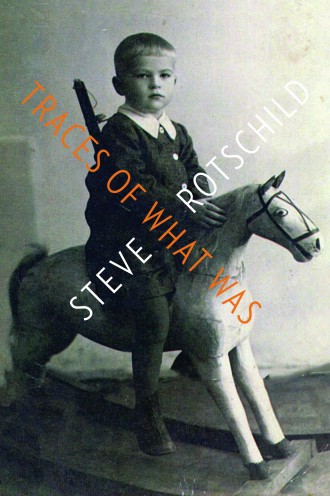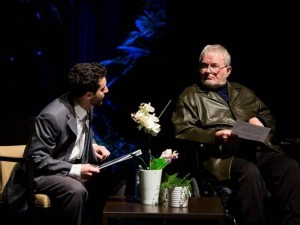 Inspired by a line from novelist Lydia Millet — “We live in what we leave behind” — Steve Rotschild began writing his memoir, Traces of What Was, at the age of 70.
Inspired by a line from novelist Lydia Millet — “We live in what we leave behind” — Steve Rotschild began writing his memoir, Traces of What Was, at the age of 70.
It was 2003, and he had realized he was the only one who knew the full story of what had happened to their family, “who were among the 70,000 Jews of Vilna during the dark days” of the Second World War.
“I had carried the story with me for a long time,” he tells me in a recent telephone interview. “I wanted to get it off my chest and to tell my children and grandchildren, so the stories wouldn’t get lost.”
“Young people,” he adds, “can’t imagine these things.”
Rotschild, who now lives in Toronto, was born in 1933 in Vilna, Lithuania. He immigrated to Israel with his mother and stepfather in 1949, and from there to Canada. In 1956, in Montreal, he married Lillian Blumenfeld; they later moved to Toronto, where they raised their two daughters.
But this brief biography doesn’t reveal what his memoir does.
In Traces of What Was, “Ten-year-old Steve Rotschild learns to hide, to be silent, to be still — and to wait. He knows the sound of the Nazis’ army boots and knows to hold his breath until their footsteps recede. Rotschild takes us on a captivating journey through his wartime childhood in Vilna, eloquently juxtaposing his past, furtive walks outside the ghetto with his long, liberating walks through Toronto fifty years after the war. Vividly evoking his experiences, this story of survival and a mother’s tenacious love leaves the reader indelibly marked by Traces of What Was,” writes his publisher.
Launched in a ceremony at the Markham Flato Theatre, Traces of What Was is published by the Azrieli Foundation, a Canadian philanthropic organization that supports a range of initiatives, including Holocaust commemoration and education. The Holocaust Survivor Memoirs Program “is guided by the conviction that each survivor of the Holocaust has a remarkable story to tell, and that such stories play an important role in education about tolerance and diversity.”
The program’s fascinating website offers a multimedia look at the memoirs in the series and their authors, featuring excerpts, maps, photos, video interviews, and historical context. There are also educational resources for teachers.
Before he began writing, Rotschild read many stories of the war that were tragic, but he was determined his memoir would be different. His favourite writers include Canadians Gregory Clarke and Rohinton Mistry, whose works he read for inspiration. He eventually decided on a structure for his book that juxtaposes thoughtful and evocatively described strolls in various seasons through his Toronto neighbourhood, representing for him moments of freedom and relative happiness, with reflections on wartime. His teenage granddaughter Michal helped with the wordprocessing and editing to pull the manuscript together.
“I needed to tell the story,” says Rotschild, who has since suffered a stroke resulting in some paralysis.
One of the most difficult scenes to set down on paper, he says, happened when he was young, during the war and on the morning after an explosion. He saw feet wearing little white shoes sticking out of the rubble of a building and thought they were those of a doll — until the body of a girl was pulled from the wreckage.
Following that passage, in a rare aside to the reader, he writes: “I hesitated a long time before writing this down. It is something I haven’t described to anyone for sixty years, the most upsetting image from among the other horrible images I carry with me from the war years.”
“I’m not very sentimental — I’ve seen a lot of death,” he says. “But some of the scenes [I remember] were terrible, especially scenes of children.”
Yet Rotschild’s writing is also filled with humour, keen observation, rich description, and an appreciation of life’s beautiful moments. “The war was raging somewhere,” he writes of his last visit to his grandparents’ home, thirty-two kilometres from Vilna,
“but in the small village of Popishok, life went on as before. The girl and her two brothers came again, and we played hide-and-seek. They counted to one hundred, and I ran through the orchard, along a grey wooden fence and into the large barn belonging to the children’s family. It was a huge, dim place with several stalls but no animals, some farm implements and wooden barrels. Against the far wall a ladder leaned up to a loft where a few bales of hay lay. The rungs were too far apart for my short legs, but I managed to scramble up and hide behind a bale, sitting against the wall clutching my knees. Soon I heard them come in. They searched the stalls and inside the barrels and then left. It was very quiet; I heard the buzzing of bees outside, then another sound, of someone climbing the ladder. I didn’t move. Then she was beside me on her knees, her hands on the floor boards, a wide grin on her face, laughter in her dark eyes. She leaned closer and kissed me on the cheek, her black hair brushing my face, and then she was gone – the sound of her bare feet on the wooden floor of the barn and out the door, the pleasant sensation of her soft lips on my cheek and the strange cucumber smell of her hair all a precious gift….
“The next day it was back to the city and the war. I never saw my grandparents and aunt Faigeh again, nor the children I played with for those few memorable days.”

Steve Rotschild (right) with his grandson Cory Austin at the launch of Traces of What Was (Photo: Eric Benchimol)
Ultimately, the miles and memories — some heartbreaking, others uplifting — that Rotschild travels in his contemplative walks bring writer and reader to a place of peace and hope.
He urges other survivors to write their own stories. “If we leave behind written accounts of ourselves,” he says, “[the dead] can still talk to the living on down through the years.”
Traces of What Was can be purchased at Second Story Press.
Memoirs in the Holocaust Survivor Memoir Program series are published in English and French and distributed free of charge to educational institutions across Canada. They are available in bookstores or online. E-book versions will be available in the near future.
Thank you, Allyson, for your very kind review of my book.
I value it greatly, coming from a writer and teacher.
Your course I took with you was very helpful in my writing.
Best regards, Steve
Be well and keep on teaching and writing.